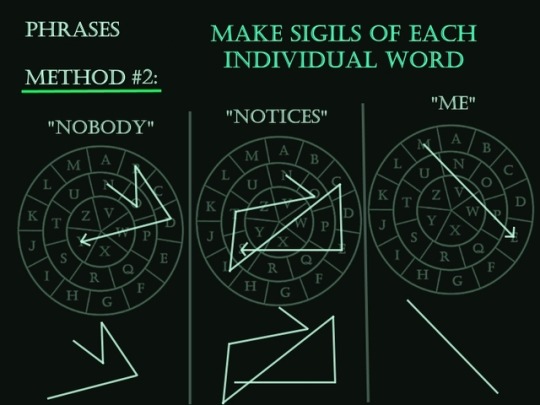Text
the Chicken furthermore tries to convince you to practice sorcery in a fun and fulfilling way
There is a difference between practicing goal-oriented practical sorcery, and placing the entire value of your sorcery on whether or not you achieved the goal. One of these things is soul-crushing.
Practicing sorcery should be it's own reward. The actual steps you are performing should be stuff that you like, or thrills you, or captures your fascination. As an activity, practicing sorcery should be satisfying regardless of whether or not the spellwork manifests properly.
If the sorcery on your plate is not satisfying, compost it and return to the endless buffet and try a different type of sorcery.
If you do not have the things you need, your first step to a spell becomes innovation. What is the purpose of the thing in the spell, and how can it be replaced?
A spell can be cast with a length of string, or a paper and pen. Or with a bit of crayon. Or a dead fly. Or with just you.
Sorcerous knowledge tends to reveal itself when the clutter of correspondences is placed aside, so having few things to practice with is not a curse.
You do not need an interpersonal spiritual friendship with every single spirit you want to work with in magic. YOU DO NOT.
Interpersonal friend relationships with spirits should probably be reserved for very special spirits in your "inner court," the beings with which you choose to share your life and that you honor as teachers and guides.
Many spirits are pleased to assist with magic, but have no interest in getting to know us personally.
Imagine if everyone in your askbox wanted to ask you for help on something you're knowledgeable about, but instead of just asking for help, they first wanted to DM you for a few weeks to make sure you're comfortable with being asked for help, meanwhile on your correspondence chart pinned post it says "I can help with [topic]! Just ask!"
Asking spirits for help in magic is a good, valid way to start building a relationship with them.
Repeatedly calling on the same spirit or type of spirit over and over in spellwork is a fantastic way to deepen your relationship with them.
Working with a spirit in magic does not mean you are obligated to build a shrine to it, venerate it, talk to it outside of spellwork, or any of that.
Practicing sorcery is not the same thing as casting a spell. Practicing sorcery also means practicing the composite skills which come together to make a spell.
A spell is like a completed painting. But to make that painting, the artist needed several skills: the ability to sketch the scene, knowledge of how to apply and work with their paint, color theory, an understanding of how to render landscapes, and so forth.
As a sorcerer, your skillset might be imbuing intent, raising energy, centering and grounding, practicing trance, practicing psychism or divination, etc.
As you gain familiarity with these things, spells become less like an imposing stranger, and more like someone you're sure you've met before.
Practice can be it's own reward, but discipline is often required for progress.
Raising energy once a day, forever? I think not.
Raising energy once a day for seven days? Or, dedicating to doing it a total of ten times this month? Perhaps so.
An artist may not be in love with every single step of the process, and sometimes a sorcerer may have to get good at a skill that's not their favorite. But if no part of the process sparks joy, then something is wrong.
Sucking at something is the first step to being kind of good at something. Be reasonable with yourself: does the beginner artist doodle a landscape, then look at their work and declare that their art "doesn't work"?
Not every witch is talented at every sort of sorcery. Not creating a potent prosperity spell after five tries doesn't mean you're bad at magic. It might mean that your current understanding of prosperity magic precludes good results, or that you are casting on one very intransigent situation, or that your true talents lie in destruction and chaos instead of peaceful growth.
Set practice goals, give it an honest go, and move on when the time is right: "I am going to practice raising Fire energy and putting it into this stone using the Pore Breathing method. I'm going to do it fifteen times."
(3 months later): "That sucked and it never worked, but I did it all fifteen times. Next I'm going to do a grounded roots visualization and use it to channel water energy to cleanse my room."
(10 days later): "That was awesome, I want to do it more than 15 times."
Play around and be silly with it. Taking your path seriously is not the same thing as taking your path somberly.
Sports teams practice drills to be ready for game day. Sorcerers are wise to take a page from their book, because when real-life game day arrives, it feels much better to deal with it when you know you've been having pretty good success with channeling water energies, so maybe it's best to do something with that, because you can't move fire for dick.
346 notes
·
View notes
Text
wrt last rebagel
So, my thoughts here are two fold. Sometimes you have to show people what experiments you're doing in order for them to understand the pattern.
So what ARE YOU doing, Anon, content wise, to show folks what kinds of experimentation you can do with tech? What are YOU DOING? Be the change you want to see - you want to have a conversation about how certain shit works, then fucking start one (and not in someone else's ask box). Provide the specs. Provide the details. Provide the items. Provide the numerical evaluations. Provide the speculation. Provide.
The second is, sometimes. People just hate tech.
There I said it. We were all thinking it. But we said it. I hate electric candles for witchcraft because as much as I could sigil that shit or as much as I could work for the batteries, it's a lot of effort for me. Versus lighting a kitchen length match and putting it on a candle that I bought or was given or found in a yard sale collection. The gate of entry for me, as a witch is much lower with a candle than an electric candle. That's why I hate them for spellwork. I can DO IT, i just don't enjoy it. And we don't do joyless witchcraft here. We don't do tortured witchcraft here. Simply put: Electric candles and Candles are not the same. Thinking they are the exact same is a fallacy discussion, doomed to fail from the start. Without recognizing that key difference, fundamentally the conversation can go no where.
However, I LOVE enchanting my backgrounds and my images that I make for spellwork. It's very similar as me painting or crafting my physical witchcraft. It is the same to me. It's the same as writing. It's the same as pointing my finger at something and working the magic. It's the same. So the bar of entry? LOW. and my willingness to do so, HIGH. And I enjoy it. So we do it. I have a lot of spells built into paintings on my phone. It's great. 10/10 recommend.
But I've already made posts and blogs and more posts about this. So again, I ask. WHAT ARE YOU doing?
105 notes
·
View notes
Text
If you haven’t given an offering to your deities/spirits/ancestors/etc in a while because you feel icky mentally or physically, here are some quick and easy options:
- water (drinkable, preferably)
- make a playlist of at least 3 songs (you can add more later if you’d like)
- talk to them, just say hi, tell them what’s going on in your life
- if you’re physically able, dance or exercise a bit!!
- read or re-read stories about them if they’re a deity
- recall fond memories you’ve had together, tell them why these memories are fond
- Buy or pick a flower/plant, put it on your offering space
- buy a lil pastry and offer it to them
1K notes
·
View notes
Text
Metal playlists for the gods (part 1?)
@thepastelpriestess You asked for it lol.
This should be no surprise but I’m stil going to say it: this is going to be brutal on many levels, both musically and lyrically and will most likely highlight darker aspects of the gods.
Apollon
Leader of the Rats - Arch Enemy
Pestilence and Plague - Judas Priest
Under Apollyon’s Sun - Celtic Frost
Eyes of Prophecy - Emerald Sun
Sun King - The Cult
Dionysos
Twice-Born - Alghazanth
Resurrection by Erection - Powerwolf
In Praise of Bacchus - Type O Negative
Dance of Dionysus - Alunah
Downhill Drunk - Tyr
Pan
The Great God Pan - Blood Ceremony
Hymn to Pan - Blood Ceremony
Homage to Pan - Ancient
Pan Satyros - Behemoth
Satyr’s Wine pt. II - Tersivel
Aphrodite
Dance Macabre - Ghost
Nothing Else Matters - Metallica
The Death of Love - Cradle of Filth
Body of Clay - Agathadaimon
A Dreaming Beauty - Graveworm
Ares
The Hundred Days Offensive - 1914
Of War - Samael
The Rise of Hannibal - Ex Deo
For A Voice Like Thunder - Rotting Christ
Visions of Fate - Primal Fear
Zeus
Ride the Lightning - Metallica
When the Eagle Cries - Iced Earth
Crimson Thunder - Hammerfall
Lightning Strikes Twice - Iron Maiden
The Storm - Ablaze My Sorrow
I might do a second part with other deities at some point. Meanwhile, feel free to add your own.
148 notes
·
View notes
Text
i made a uquiz - of the many faces of dionysus, which is turned toward you?
496 notes
·
View notes
Note
What do you think of Joyofsatan.org? They claim to follow the Sumerian God Enki-Satan and they’re the largest Satanist group in the world.
They’re Nazis. Full stop they are self proclaimed Nazis.
“Joy of Satan Ministries believe that one of the benign aliens, Enki, which they consider to be Satan himself, created with his collaborators on Earth human beings through their advanced technology of genetic engineering. It's considered by Joy of Satan that most salient of his creations were the Nordic-Aryan race. They declare that the Reptilians have, in turn, created their own kind by combining their own DNA with the DNA of semi-animal humanoids with the result identified as the Jewish race.”
I’ve found absolutely no source saying they’re the “largest satanist group in the world” though, and I’d be highly skeptical of such a claim. Scientology does something similar (we have Millions of members and you can’t prove otherwise!) so I’d take that with a grain of salt.
4K notes
·
View notes
Photo

“I Am Hired”
Burn this sigil and sprinkle the ashes around a copy of your resume before handing out resumes while job hunting (that aren’t covered in ash)
3K notes
·
View notes
Photo








How to use a sigil wheel.
A tutorial.
I rarely use this method myself, but I know people are always looking for tutorials on different methods of sigil making and not finding any.
I’ve had a few different people asking for more graph based sigil making techniques, and this is a fairly well known one that fits that category.
I hope this tutorial is coherent and answers questions instead of making things more confusing. If you have any questions, however, never be afraid to ask.
19K notes
·
View notes
Note
Baby witch here!
I REALLY wanna take an oath on my gods, Artemis and Athena.
But idk how to take an oath!!
How long have you been worshipping them? If the answer is less than 5 years, please don't. And if you're still a minor, please don't, period.
368 notes
·
View notes
Text
Yea as a chronically ill practitioner I particularly resent the frequent interactions thing. I *don't* frequently interact with the Gods I worship, because I'm too sick to do so on top of stuff I need to do to stay alive (eat, sleep, work a job, etc) to worship more than pretty infrequently, but I'm absolutely still worshipping them
Important Distinction Between 'Devoted To', 'Worshipping', and 'Working With' Concerning Connections with Deities🕯
I feel like there's a huge misunderstanding surrounding the use of the terms 'devoted', 'worship', and 'working with' in Hellenist, pagan, and polytheist communities. So many times I see people using terms incorrectly or even scolding others for saying they 'work with' certain deities, so I think it's time we clear the air here.
Honestly though, I don't blame anyone for misusing terms like these as they are somewhat obscure even in these communities.
It comes down to the fact that there are three different categories of relationships you can have with your deities, these being guidelines. Now, this concept is more of a pagan concept than a polytheist concept, and I'm not sure how present it is in Hellenism specifically. But, there's a definite difference between polytheism and paganism in this regard.
This is one of the main reasons I most often refer to myself as a Hellenic Pagan when talking about my religion. Sometimes I'll say Hellenist, but not polytheist.
Quick simplified explanation: polytheism is the belief in multiple gods, whereas paganism is more about connection with energies, divine or not. There are polytheistic, monotheistic, and atheistic pagans. Hence, witchcraft and paganism overlap more than witchcraft and polytheism do.
Now back to my original point. Because of this slight difference in approach and values between paganism and polytheism, the idea of having these three categories of relationships with deities will likely appeal more to pagans than polytheists (that's not to say this can't apply to polytheists as well, or that it applies to all pagans).
Now a simple breakdown of each term.
'Worship': To worship a deity is, for the sake of the explanation, like the standard issue package. You make offerings, you connect with them, they bring their influence into your life in one way or another, etc.
You frequently interact with the deities you worship.
You don't necessarily need a deity's consent to worship them, though it depends on the deity and situation. Personally, I have found that you, for the most part, don't need given permission.
I personally worship Dionysus and Ares.
'Devoted to': A devotee is, you could say, like the next level up from a worshipper. It doesn't mean one is better than the other. It is simply a different relationship. You and your deity must know each other very well, which is why it is generally not recommended for beginner practitioners to become devotees right off the bat. In most if not all cases, including my own, you must ask and receive consent from the deity you wish to be devoted to, and it is generally oath bound.
For me, oath bound didn't mean anything elaborate or ritual-ly. I swore a simple promise to Apollo, and he swore one to me. He and I have been connected since day one, and I think even before I became a Hellenist. Devotion implies an intense relationship and a deeper connection between you and your deity. I won't go into detail, but it's an interesting topic to read up on should the fancy strike you.
'Working with': This is a term that receives a lot of backlash, simply because it is misunderstood. The problem a lot of people seem to have with the term, is the fact that it sounds like the mortal involved is holding the deity at the same level as themselves. This is very false.
Working with a deity is a beautiful practice that involves you connecting with them and their divinity to bring the values they hold into your life. It is the method you turn to when worshipping this particular deity frequently just doesn't work for you, but you really don't want to lose your relationship with them. It means that you invoke a connection with them at certain times. It is not always a frequent thing like worship, although it can be.
Personally, this was the case for me when I started connecting with the Dioscuri (Castor and Pollux). The values they hold and embody are important to me, personally and professionally. I turned to them because I felt drawn to them, but when I tried to start worshipping them, everything just stopped. Nothing worked and all connection got inadvertently cut off. I was gutted for a while, knowing that I must have approached them in a way they didn't want me to. Then, I started working with them, changing the dynamic of our relationship to one that actually works perfectly for us.
Personally as an athlete, I usually connect with Castor and Pollux before a competitive fight. I invoke a connection with them when I feel that I need them. It does not mean that I take without giving back; I give offerings and I am even working on a small altar dedicated to them. I simply don't connect with them as often as I do with the deities I worship. That's all it is. It is a wonderfully liberating practice if it happens to be right for you.
I know this was a long post. I just feel that this is such an important distinction to make. Thank you so much for reading. Have a blessed day ☀
Also please tell me if I got anything wrong, and I'll correct it.
221 notes
·
View notes
Photo

✨ W𝕚𝕥𝕔𝕙𝕔𝕣𝕒𝕗𝕥 + C𝕙𝕣𝕠𝕟𝕚𝕔 I𝕝𝕝𝕟𝕖𝕤𝕤 ✨
Following on from yesterday’s post, this tarot spread is at heart a self care spread. Sometimes we need a little guidance and help, especially when suffering from any kind of chronic illness and pain.
Just be kind to yourself where you’re at now! You’re not alone! 💕
This spread works well with oracle cards too!
Lindsay 💜
——————————————————————
#chronicillness #spoonies #eclecticwitchcraft #greenwitchcraft #wiccan #moonphases #themoon #astrology #balance #cycles #energy #tarot #instagram #bruja #traditionalwitchcraft #traditionalwitch #wicca #pagan #witch #witchcraft #witches #witches #tarot #tarotspread #nature #witchesofinstagram #witchy #magick #witchyvibes #witchythings #witchystuff #witchywoman
https://www.instagram.com/p/CWLZVcPNzms/?utm_medium=tumblr
296 notes
·
View notes
Note
Please help. I'm asking this in all seriousness, and prefer to ask *you*. Explain (if you please) how it's ok to talk to spirit guides and "fae", see them and connect with, but it's only ok if you're not diagnosed as neurodivergent. Except for the person who was diagnosed as all the things, it's ok for him. Honestly, not following and some people are getting really rude as opposed to being clear. There's a lot going on here and it's gotten confused in The Drama. Please help.
Consider the difference between a priest going to school to learn scripture and slowly build a deep and intentional relationship with God over the course of several years, and an unmedicated scitzoeffective person being the victim of hallucinations.
It's the difference between writing a story, and hallucinations with a plot.
Additionally, you can form relationships with the strange and divine, but you need to be able to discern the lucid from the delusional.
901 notes
·
View notes
Text


1 - The Oschophoria marks the first Dionysian celebration of the Athenian calendar, on the 6th of Pyanopsion. Plutarch tells us that this festival was created by Theseus, after performing a rite to express his gratitude to Athena and Dionysus, who had appeared to him on the island of Dia. The Athenians performed a procession that went from the shrine of Dionysus to the precinct of Athena Skiras. This procession was led by two “youths dressed as women” carrying vine branches. The procession was lively as participants sang “oschophoric songs” and danced. The festival also seems to have included a race alongside the traditional dinner and libation.
2- On the 7th of Pyanopsion was celebrated the Pyanopsia in honour of Apollo. This festival is intimately linked to Thargelia (in May). Like with the Thargelia, the Pyanopsia included a procession to the sanctuary of Apollo and the offering was a stew. For the Thargelia, it was of first-fruits, but for this festival, it was a bean stew. The procession would be led by a boy carrying a branch of laurel and was then fastened above the door of the sanctuary. Those branches were called eiresionai, and it is possible that the Athenians also placed those above the door of their houses as a sign of fruitfulness. Pausanias gives a different version of what the eiresionai were, by telling us they were olive branches garlanded with wools and various fruits (probably dried), attached to it.
Plutarch tells us of a song sung at the Pyanopsia that goes this way (Theseus, 22)
Eiresione for us brings figs and bread of the richest, brings us honey in pots and oil to rub off from the body, Strong wine too in a beaker, that one may go to bed mellow.
εἰρεσιώνη σῦκα φέρει καὶ πίονας ἄρτους καὶ μέλι ἐν κοτύλῃ καὶ ἔλαιον ἀποψήσασθαι καὶ κύλικ᾽ εὔζωρον, ὡς ἂν μεθύουσα καθεύδῃ.
45 notes
·
View notes
Text
Early Modern Reconstructionist Witchcraft
Getting quite frustrated about a trend in what could be called Early Modern Reconstructionist Witchcraft: a trend of taking particular ideas about reported historical practises in early modern and often also medieval Europe (and especially England and Scotland) and attempting to codify them as The True Witchcraft - often partially or completely devoid of the actual cultural and religious context of these practices (and without critical analysis of whether they *were* actual practices, when they come via trial reports), and often along with an American fetishisation of Europe. It’s giving me a thumping headache.
Look, being inspired by the imagery of witchcraft in early modern (& earlier & later) England, Scotland, Western Europe is great. Flying ointments, diabolical Sabbats, wild hunts & furious hosts and faery rades, familiar spirits, Diana and Habondia and their spiritual sisters - it’s great stuff, it’s juicy, it’s a real current in historical thought that’s affected our present day ideas. The image of the cunning wo/man (whether of the mystic-cottage-full-of-herbs variety or the canny sometimes-rip-off-merchant practising what Pratchett termed Headology one [and the two are not exclusive]) is fertile inspiration for modern practice. I draw on this stuff myself, obviously!
But please, please be wary of anyone trying to tell you that modern, developing practises derived from (often selective) historical reports and modern interpretations of them are What People Did And How People Thought/Believed Back Then! Especially if the same people are deriding twentieth-century witchcrafts inspired by people like Murray - because those witchcrafts were *also* based on (often selective) historical and archaeological information of their day and the contemporary interpretations of them. (And extra especially if those people have books or classes to sell!)
The reaching for ‘authenticity’ is an understandable urge, and can be a real spiritual and magical hunger for roots and meaning. But claims of *historical* authenticity in contemporary, reconstructed practices should always be treated with wariness - because there’s always more evidence to come along, new ways of looking at the past to develop, and what seems like an obvious historical survival today is going to look like Murray’s witch cult and Frazer’s Golden Bough in ten, twenty, fifty years’ time. (And hey, people can and do still draw valid personal inspiration from those, we just need to understand they’re not History Fact.)
Any practice that looks back to the past is necessarily a child of historiography as much as history. And historiography is a constantly evolving thing. So…just be thoughtful, okay? If stuff speaks to you, that’s great, work that current ‘til your arse falls off. Just be wary of believing - or making - claims that what you’re doing is More Real, More Accurate, More Authentic, More Historical than what other people are doing.
564 notes
·
View notes
Note
Is Aphrodite the only (major-ish) god in the Greek pantheon over gender nonconformity? Sometimes I hear people cite folks like Dionysos as well but idk if that's just a big neopagan upg or like an actual Thing? Like I know Aphrodite has myths those types of myths and associations but wasn't sure if she's the head honcho of trans or whatever 🫀✨
She's the big one but Dionysus and Hermes also have aspects of Gender Shit.
434 notes
·
View notes
Text
How to Make an Offering as a Hellenic Polytheist (based on historical methods)
Get the attention of the deity you’re making an offering to, this is typically by calling out their name, and/or some epithets. You don’t have to use epithets, it’s more formal if you do though. Epithets can also give the advantage of telling the theos your calling on, exactly what it is about them you’re about to be praising.
Same some nice shit. Tell them why you’re about to make an offering to them. This can be anything from, “This is my weekly offering” to “I think you’re pretty cool” or “Thanks for your help on that test last Tuesday” ect…
Define the offering. This is where you usually tell them what the offering is. Juice, fruit, wine, a bit of jewelry you’re dedicating to them, a devotional act you’re planning on partaking, ect…
Give them the offering. If you don’t have an altar or shrine space, this one can be a bit more difficult. But, there’s always a way to make it work. You can, for example, declare that you’re dedicating a necklace to Aphrodite, and now wear it in her honor, and then put the actual necklace on; or put it in a jewelry box for safe keeping until you do wear it.
(optional) Make your petition if you have one. This is where you can say, please do me this favor or help me with this thing.
Thank them for paying attention and *hopefully* accepting your offering.
If you want, you can even write a devotional hymn, prayer, or poem, that follows same structure as making an offering, and recite that while making an offering. For example:
Dionysus Anthion(of the flowers),
Crowned in flowers and ivy,
Staphylitês (of the grape).
With fruit sweet on our tongues and wine dark in our glasses,
We call to thee,
Glorious God of fruit-bearing vines,
And ask that you bear witness to this offering.
We sing your praises in hymn,
As we pour libations of cream and honey,
Quenching the parched Earth’s thirst,
Feeding your sacred vine.
((optional lines)Drink of the cream,
Taste our sweet honey,
And bless these vines,
That we may have a bountiful harvest.)
We thank thee, Dionysus,
Your humble followers,
For your many glorious gifts.
It clearly outlines who you’re calling, what you like about them (in this particular context) what you’re giving them, how you’re giving it to them, and then thanks them. With the optional example in there of petitioning for something in return for the offering. It can be helpful for some folks, and it certainly makes it feel more ceremonial in my opinion; but it’s not a necessity.
Another form of offering format is much more for the sake of petition. It gets pretty straight to the point, asking for what you want. This is more like trying to cash in favors than it is a straight up offering, but is still a valid part of Hellenic Polytheism.
Call on the theos in question, by calling their name. You can also state epithets if you desire, or add a bit of praise. That way you’re not (metaphorically) walking up to a deity and saying, “Hey, remember that time I did X, well I want Y now.”
Call on your kharis or relationship with the particular theos you’re petitioning, and any of their connections you might be in good with. This is where you point out things you’ve done for them.
Make your petition, explain to them what you need. Make it clear, but realistic.
Make an offering or promise of future offerings upon completion of your request. Be clear about the offering, define it. It doesn’t work too well to say, “I’ll give you anything you want” because look at how hard it is for mortals to understand deities on any given day, we’re not likely to figure out exactly what they want, or we might not agree to their cost in hindsight. Offer what you think is fair trade, and what you’re willing and capable of giving, but keep in mind what the theos may want.
Keep in mind that the theoi have every right to ignore petitions, or simply decide they aren’t going to do it. Nothing we do as followers obligates the theoi to help us, but we can always ask when we need it.
Again, written or verbal devotions can be helpful for keeping this structured and making it more formal if you desire. I’ll provide another example:
Cunning Ariadne,
Wife of Wine-Dark Dionysus,
Sister to the Minotaur,
If ever I have poured libations in your honor,
I ask you to hear me now.
Aid me in unraveling this problem,
Show me the path I must take.
For when I pass this trouble unscathed,
I shall sing your glories,
Pouring out unmixed wine to you on every night the moon is dark,
Until the year passes to a close.
You can be as poetic or plain as you like if you decide to use hymns, prayers, or poems with your offerings and petitions. It’s all personal taste.
Ways of Making Offerings in Hellenic Polytheism
There are as many ways to make offerings in Hellenic Polytheism, as there are Hellenic Polytheists. Everyone ends up developing their own ways of doing things. These are some examples of common offerings though.
Burning Offerings:
Burning offerings is most common with food. An offering is declared for a theos, and then burned in a (typically) open flame. This is a great way to make offerings for any deity in the Hellenic pantheon. Both Ouranic and Khthonic deities, as well as pretty much every other entity in Hellenism, accepts offerings that have been burned. Always be safe when using fire, and especially when placing things in an open flame.
Libations:
Libations are liquids poured out to the theoi. There are a couple different ways to do libations.
Khthonic entities tend to prefer their libations poured directly onto soil. This includes not just Khthonic deities, but also some daimons and the dead. Neat fact, some ancient Grecian graves had a fancy jar above the grave, with a hollow bottom, so that family of the deceased could pour libations into the jar and it would fall directly into the soil.
Another way to do libations is to pour them into a drinking glass, or decorative vessel. This method is more common for Ouranic deities. In this method, you should dispose of the remaining liquid after a while, to keep it from getting gross.
Feeding the Theoi:
Food offerings for the theoi can be given in ways other than burning.
A method that I’m quiet fond of is to set an extra place for the theos you’re offering to to. This means that if everyone else gets a placemat, a plate, fork and knife, glass, and napkin, the place for the theos gets the same set up. You call on them before starting the meal, explaining you’ve set a place for them to join you, and asking them to partake of your meal. You then go about dinner as normal, not actually serving anything to the plate. This makes the dinner itself more of an offering than any specific food.
You can also share food with the theoi. If you’re worried about offending the theos you’re offering to, just ask them first, they will let you know if they’re unhappy with the idea. What I mean by sharing food with them, is to literally share. To eat the same food you offer them. In this instance you offer them the food, and then you can either explain that you are sharing it with them and dig right in, wait a little while before eating it, or share it with other people who might be there. This is a good way to make sure food doesn’t go to waste. Not every occasion is appropriate for sharing your food with the theoi, but ti’s also a great way to make food offerings if you’re worshiping on the down low.
Finally, we’ve got the method of setting out a plate or item of food, and not touching it. This is common for Khthonic deities and the dead, especially the dead. It was considered bad luck to share food with the dead, so food offerings for the deceased weren’t eaten.
Burial:
Another way of making offerings to Khthonic entities is to bury items that are being offered to them. Bury a few coins for an honored ancestor. Bury that roll you set our for Haides (just be aware something may very well eat it). People would make offerings to Khthonic entities in or on the ground, because it was symbolically closer to the entities themselves. So burying offerings is symbolic of basically handing them the offering.
Displayed:
Not all offerings are things that get disposed of. Some things are permanent items, and items we intend to keep for a long time. These items can be displayed almost anywhere. If you have an altar or shrine, then that’s a great place, but you can also put them anywhere you want. Maybe on top of a bookshelf? Or the kitchen counter?
What to Offer
I strongly suggest looking at the specific theoi you want to make offerings to, in order to find out what they would like. Different deities have preferences and favorites that they like to receive.
There are general offerings though that will be accepted by almost all the theoi.
Food
Drink
Incense
Coins (some theoi like coins a lot)
Writing
Art
Pretty Decorations
Flowers
How to Get Rid of Offerings
As mentioned above, not all offerings are disposed of in the act offering. When this happens, we need to look at how to respectfully dispose of an offer before it gets gross.
For libations, I’ll either pour them out into my garden, or let the act of washing my offering chalice remove the libation. The second form is the most common way I do it. I’ll start the sink running, and place the chalice underneath the water so it overflows until the water spilling out runs clear. Then I wash and dry my chalice, and put it back on my shrine.
For food offerings, it’s a bit harder. If you offered compostable items, then you can always put them into your compost bin as a respectful way of disposal. If you’ve offered things like meat, then you don’t have much choice but to burn it or throw it away. My recommendation for respectfully throwing away offerings is to offer a quick prayer when you remove the offering, throw it away, and then wash the offering plate it was on and clean the general area the offering was in. This makes it pretty clear that you’re not taking the offering away, but cleaning up instead.
697 notes
·
View notes





